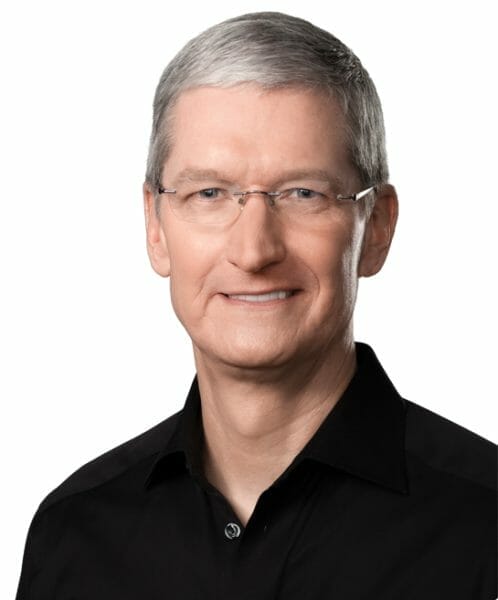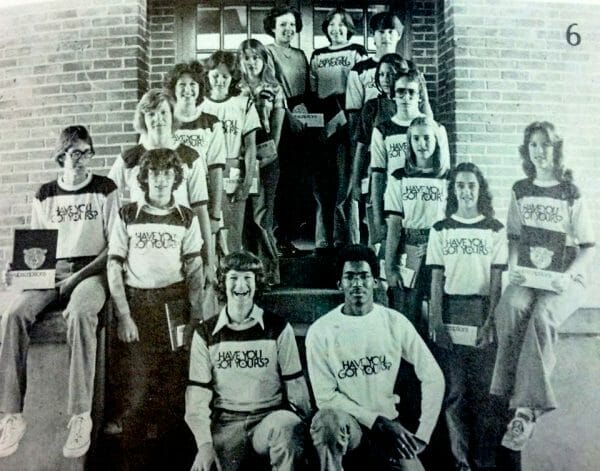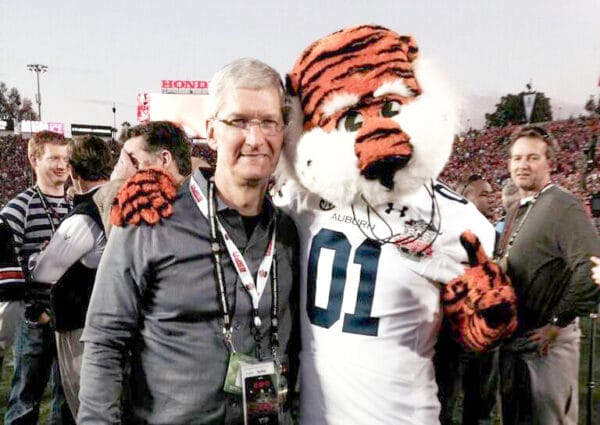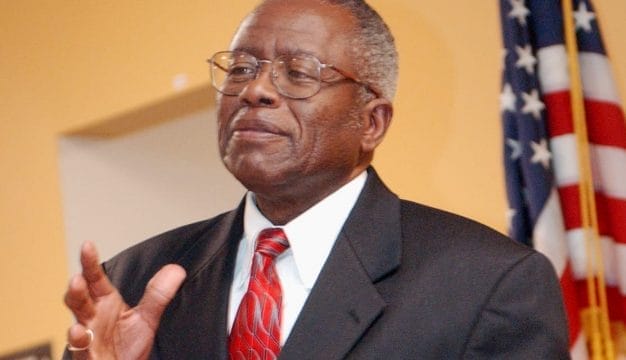Tim Cook
Mobile County native Timothy Donald “Tim” Cook (1960- ) is a computer engineer and business executive. He took over the reins of Apple Inc., U.S.-based multinational computer and electronics company, as chief executive officer (CEO) in 2011.
 Tim Cook
Cook was born on November 1, 1960, in Mobile, Mobile County, to Don and Geraldine Cook; he has two brothers. Tim’s father worked as a foreman for the Alabama Dry Dock and Shipbuilding Company, and his mother worked at a drug store. His family resided briefly in Mobile and Pensacola, Florida, but settled in the small town of Robertsdale, Baldwin County, in part because they wanted their children to attend the same school. When he was old enough to work, Tim held several part-time jobs, including delivering newspapers, working at a local restaurant, and working with his mother at the drugstore. An excellent student, Cook also played trombone and served on the school’s yearbook staff. He graduated second in his class in 1978. Cook attended Auburn University, having wanted to study there since he was a small child, and graduated in 1982 with a bachelor’s degree in industrial engineering.
Tim Cook
Cook was born on November 1, 1960, in Mobile, Mobile County, to Don and Geraldine Cook; he has two brothers. Tim’s father worked as a foreman for the Alabama Dry Dock and Shipbuilding Company, and his mother worked at a drug store. His family resided briefly in Mobile and Pensacola, Florida, but settled in the small town of Robertsdale, Baldwin County, in part because they wanted their children to attend the same school. When he was old enough to work, Tim held several part-time jobs, including delivering newspapers, working at a local restaurant, and working with his mother at the drugstore. An excellent student, Cook also played trombone and served on the school’s yearbook staff. He graduated second in his class in 1978. Cook attended Auburn University, having wanted to study there since he was a small child, and graduated in 1982 with a bachelor’s degree in industrial engineering.
After graduating, Cook took a job with technology giant IBM. Cook’s talent and promise revealed itself early in his career there, and he found himself placed on a “high-potential list” of young IBM managers. He would eventually rise to the position of director of North American Fulfillment. While at IBM, Cook earned an MBA from the Fuqua School of Business at Duke University in Durham, North Carolina. In 1994, Cook left IBM for Intelligent Electronics and continued his rise in position, becoming the chief operating officer (COO) of the Reseller Division of that company. He then joined Compaq Computers, at the time one of the largest computer companies in the world. From 1997 to 1998, he served as vice president of the Corporate Materials Division.
 Tim Cook in High School
In March 1998, Cook was recruited by Apple Inc. co-founder Steve Jobs to join the company during the start of a period of restructuring. Jobs had rejoined Apple in 1997 after a long absence because the company was suffering a serious decline, bearing little resemblance to the bold technological leader it had been during the 1980s. Cook was brought in as senior vice president for worldwide operations and began laying the groundwork for Apple to become more adaptable in the fast-moving and ever-evolving world of technology. Cook closed warehouses and reduced Apple’s inventory to a mere few days’ worth, shifting to a “built-to-order” or “just in time” manufacturing model. The strategy allowed the company to move quickly when new products were introduced without the risk of ending up with a stockpile of obsolete products. Apple thus was able to focus more on design innovation, technological advancement, and profit maximization. In 2004, Steve Jobs fell ill with pancreatic cancer, and Cook served as acting CEO twice when Jobs took medical leave for treatment. In 2007, Cook was named COO of Apple.
Tim Cook in High School
In March 1998, Cook was recruited by Apple Inc. co-founder Steve Jobs to join the company during the start of a period of restructuring. Jobs had rejoined Apple in 1997 after a long absence because the company was suffering a serious decline, bearing little resemblance to the bold technological leader it had been during the 1980s. Cook was brought in as senior vice president for worldwide operations and began laying the groundwork for Apple to become more adaptable in the fast-moving and ever-evolving world of technology. Cook closed warehouses and reduced Apple’s inventory to a mere few days’ worth, shifting to a “built-to-order” or “just in time” manufacturing model. The strategy allowed the company to move quickly when new products were introduced without the risk of ending up with a stockpile of obsolete products. Apple thus was able to focus more on design innovation, technological advancement, and profit maximization. In 2004, Steve Jobs fell ill with pancreatic cancer, and Cook served as acting CEO twice when Jobs took medical leave for treatment. In 2007, Cook was named COO of Apple.
In January 2011, Jobs again took medical leave and resigned his position as CEO; Cook was named as his replacement that August. Soon after though, Apple came under heavy criticism as the plight of overseas factory worker’s conditions, especially publicity surrounding several suicides at Foxconn Industries, an Apple supplier in China. Cook responded to the criticism and promised to improve working conditions in the company’s overseas factories. Apple had tracked conditions inside contractor factories since 2006, but the company took the additional step under Cook of publishing an annual list how many hours employees worked. In 2012, Cook visited several overseas factories as Apple audited working conditions in them. Under Cook’s leadership, Apple also began using 100-percent renewable energy in its data centers and built factories in Arizona and Texas to stem the tide of job outsourcing in the tech industry. Since taking over for Jobs, Cook has also been criticized for being too focused on the manufacturing process and lacking the vision and creativity of Jobs. Despite this criticism, Cook has overseen one of the greatest growth periods in company history. Some observers compare Cook to Jobs and find the former lacking, but Cook has noted that Jobs advised him to think not of what Jobs would do, but rather to “do what is right.”
 Tim Cook and Aubie
As CEO, Cook has continued to promote Apple’s progressive core beliefs of valuing diversity, equality, and humanity and producing products accessible to people with disabilities. In a 2013 Wall Street Journal op-ed, he encouraged Congress to pass the Employment Nondiscrimination Act, which would protect workers from workplace discrimination based on sexual orientation and gender identity. He noted that when employees have to hide their identities and orientations in the workplace, it prevents them from being free to express themselves and give their best to their job. He reiterated these themes while accepting a lifetime achievement award from Auburn University that December, citing civil rights leader Martin Luther King Jr. as a role model and advocating for immigration reform and ending discrimination based on sexual orientation and gender identity. In October 2014, Cook called for Alabama to do more to protect the rights of LGBT (lesbian, gay, bisexual, and transgender) people during his induction into the Alabama Academy of Honor. It had long been rumored that Cook was gay, and he confirmed this in an October 30 commentary in Bloomberg/Businessweek. He noted again his admiration of King’s efforts on behalf of the rights of others and his desire to serve as an example to other gay Americans as the reason behind his decision to publish the piece. Elsewhere, he has also defended the company’s embrace of environmental causes even when providing a public good is not necessarily of benefit to business.
Tim Cook and Aubie
As CEO, Cook has continued to promote Apple’s progressive core beliefs of valuing diversity, equality, and humanity and producing products accessible to people with disabilities. In a 2013 Wall Street Journal op-ed, he encouraged Congress to pass the Employment Nondiscrimination Act, which would protect workers from workplace discrimination based on sexual orientation and gender identity. He noted that when employees have to hide their identities and orientations in the workplace, it prevents them from being free to express themselves and give their best to their job. He reiterated these themes while accepting a lifetime achievement award from Auburn University that December, citing civil rights leader Martin Luther King Jr. as a role model and advocating for immigration reform and ending discrimination based on sexual orientation and gender identity. In October 2014, Cook called for Alabama to do more to protect the rights of LGBT (lesbian, gay, bisexual, and transgender) people during his induction into the Alabama Academy of Honor. It had long been rumored that Cook was gay, and he confirmed this in an October 30 commentary in Bloomberg/Businessweek. He noted again his admiration of King’s efforts on behalf of the rights of others and his desire to serve as an example to other gay Americans as the reason behind his decision to publish the piece. Elsewhere, he has also defended the company’s embrace of environmental causes even when providing a public good is not necessarily of benefit to business.
Further Reading
- Cook, Tim. “Tim Cook Speaks Up.” BloombergBusinessweek, October 30, 2014; http://www.businessweek.com/articles/2014-10-30/tim-cook-im-proud-to-be-gay.
- Eaton, Kit. “Tim Cook, Apple CEO, Auburn University Commencement Speech.” Fast Company, May 14, 2010; http://www.fastcompany.com/1776338/tim-cook-apple-ceo-auburn-university-commencement-speech-2010.
- Finch, Michael, II. “Tim Cook, Apple CEO and Robertsdale’s Favorite Son, Still Finds Time to Return to His Baldwin County Roots.” Al.com, February 24, 2014; http://blog.al.com/live/2014/02/tim_cook_–_apple_ceo_and_robe.html.



